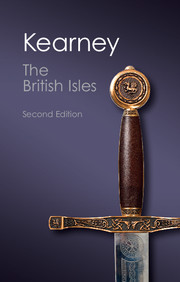Book contents
- Frontmatter
- Contents
- List of illustrations
- List of maps
- Preface to the first edition
- Preface to the second edition
- Map: the British Isles
- Introduction
- 1 The Celtic societies of the British Isles
- 2 The impact of Rome on the British Isles
- 3 The post-Roman centuries
- 4 The Vikings and the fall of the Old Order
- 5 The Norman and post-Norman ascendancy
- 6 The decline of the post-Norman empire
- 7 The making of an English empire
- 8 The remaking of an empire
- 9 The Britannic melting pot
- 10 The rise of ethnic politics
- 11 Between the wars
- 12 Withdrawal from empire
- 13 Post-imperial Britain: post-nationalist Ireland
- Afterword
- Selected reading list
- Index
13 - Post-imperial Britain: post-nationalist Ireland
Published online by Cambridge University Press: 05 June 2014
- Frontmatter
- Contents
- List of illustrations
- List of maps
- Preface to the first edition
- Preface to the second edition
- Map: the British Isles
- Introduction
- 1 The Celtic societies of the British Isles
- 2 The impact of Rome on the British Isles
- 3 The post-Roman centuries
- 4 The Vikings and the fall of the Old Order
- 5 The Norman and post-Norman ascendancy
- 6 The decline of the post-Norman empire
- 7 The making of an English empire
- 8 The remaking of an empire
- 9 The Britannic melting pot
- 10 The rise of ethnic politics
- 11 Between the wars
- 12 Withdrawal from empire
- 13 Post-imperial Britain: post-nationalist Ireland
- Afterword
- Selected reading list
- Index
Summary
At the end of the twentieth century, Britain retained many external features of a tradition-bound society – an hereditary monarchy, an hereditary peerage, and a system of public honours which included the medieval title of knighthood. In England there was also an established church of which the monarch was the supreme governor. The annual opening of parliament provided a ritual setting in which these institutions found a place. In the flourishing modern tourist industry such traditional features are emphasised. In fact, however, rituals conceal the extent to which radical changes have taken place in the political, social and economic configuration of the United Kingdom as a whole as well as in the Republic of Ireland. In 1999 the Anglo-Scottish Act of Union dating from 1707 was substantially modified with the establishment or (re-establishment as many saw it) of a Scottish parliament elected by proportional representation and possessing considerable financial and political powers. In Wales also, in 1999, a Welsh Assembly was opened in Cardiff, giving expression to Welsh distinctiveness. Scotland and Wales had indeed gained ‘Home Rule.’ Within Ireland, the six-county unit of Northern Ireland created in 1920, had long possessed its own devolved parliament. In 1972, however, soon after ‘Bloody Sunday’ when thirteen civilians were shot by British paratroopers, the Westminster government imposed Direct Rule. On Good Friday in 1998 after almost twenty years of communal violence a provisional form of self-government based on power sharing was set up, although this also ran into difficulties and at time of writing still faces an uncertain future.
- Type
- Chapter
- Information
- The British IslesA History of Four Nations, pp. 304 - 321Publisher: Cambridge University PressPrint publication year: 2012



